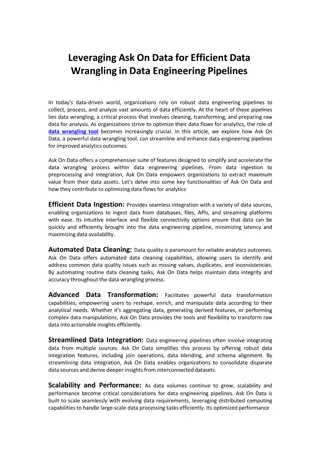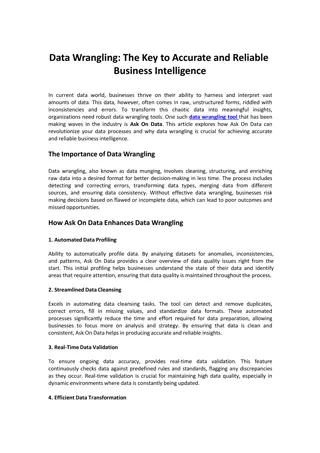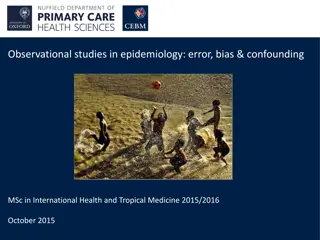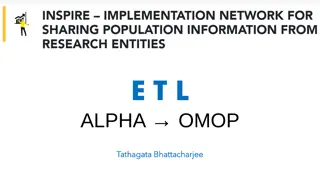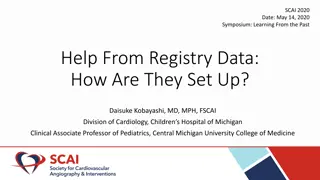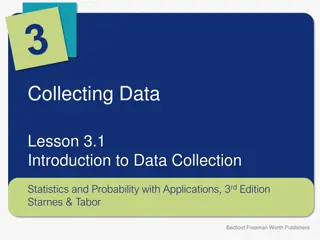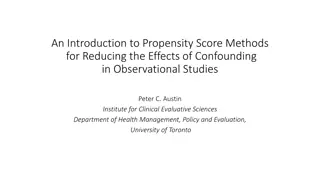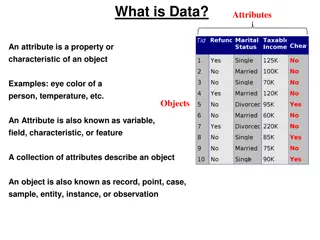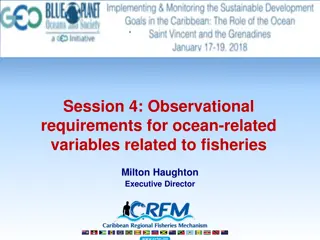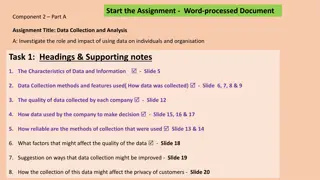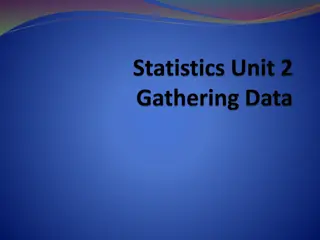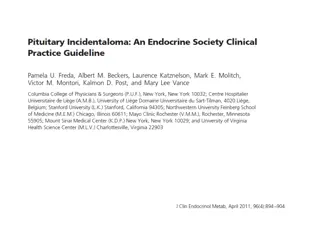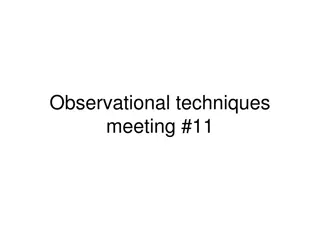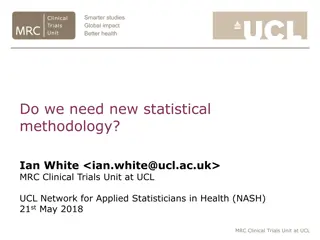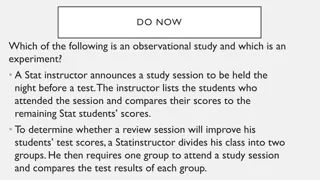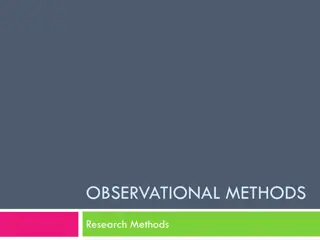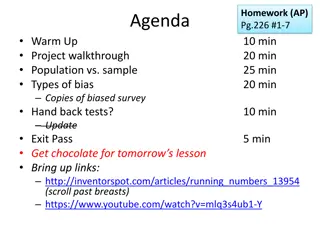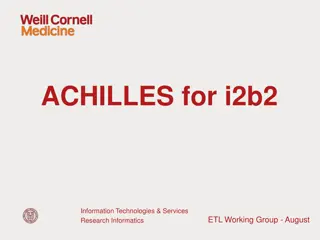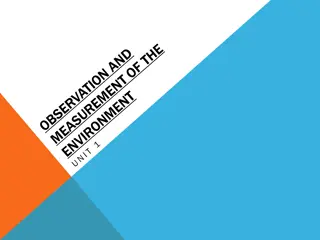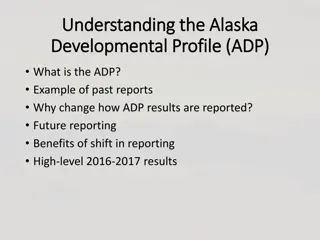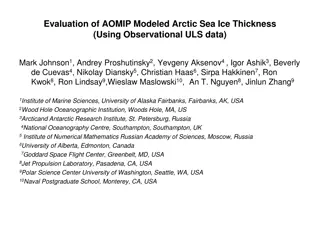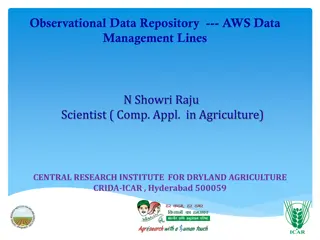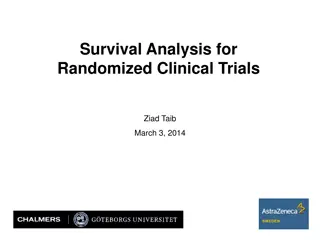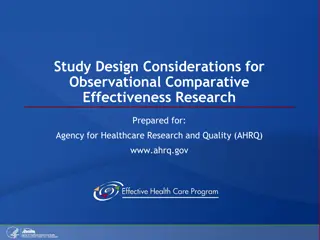Fifth SOFF Steering Committee Meeting
The decisions made during the 5th SOFF Steering Committee Meeting regarding the compliance of stations with GBON requirements. It emphasizes the need to secure an adequate supply of observational data for global NWP centers and highlights the importance of station compliance, data exchange, and main
21 views • 8 slides
Understanding Quantitative Research Designs in Health Research
Quantitative research designs play a crucial role in health research, offering various methodologies like experimental and observational designs. Observational designs are commonly used and can establish associations but not causality. Longitudinal designs track outcomes over time, providing valuabl
3 views • 25 slides
Ask On Data for Efficient Data Wrangling in Data Engineering
In today's data-driven world, organizations rely on robust data engineering pipelines to collect, process, and analyze vast amounts of data efficiently. At the heart of these pipelines lies data wrangling, a critical process that involves cleaning, transforming, and preparing raw data for analysis.
2 views • 2 slides
Data Wrangling like Ask On Data Provides Accurate and Reliable Business Intelligence
In current data world, businesses thrive on their ability to harness and interpret vast amounts of data. This data, however, often comes in raw, unstructured forms, riddled with inconsistencies and errors. To transform this chaotic data into meaningful insights, organizations need robust data wrangl
0 views • 2 slides
Understanding Observational Studies in Epidemiology
Delve into the realm of observational studies in epidemiology, exploring concepts such as error, bias, and confounding. Discover the significance of various study designs, from case reports to prospective cohort studies, in elucidating associations and establishing causality in non-communicable dise
0 views • 58 slides
Deep Dive into ETL Workflow for Integrating OMOP Data Models
This content delves into the process of ETL (Extract, Transform, Load) for integrating OMOP (Observational Medical Outcomes Partnership) data models, focusing on mapping ALPHA residencies to the OMOP person table. It covers loading data, data profiling, and mapping strategies in a detailed demonstra
1 views • 9 slides
Understanding Clinical Registries: Key Concepts and Implementation Strategies
Clinical registries play a crucial role in tracking real-world data and outcomes for various medical conditions. They are observational databases that collect data systematically for specific purposes. Distinct from clinical trials, registries provide insights into broader patient populations and re
0 views • 17 slides
Introduction to Data Collection & Statistics: Understanding Statistical Questions, Population, and Sampling
This material introduces the fundamental concepts of data collection and statistics. Learning objectives include distinguishing statistical questions, identifying populations and samples, and understanding the difference between observational studies and experiments. It discusses the process of stat
1 views • 14 slides
Understanding Data Governance and Data Analytics in Information Management
Data Governance and Data Analytics play crucial roles in transforming data into knowledge and insights for generating positive impacts on various operational systems. They help bring together disparate datasets to glean valuable insights and wisdom to drive informed decision-making. Managing data ma
0 views • 8 slides
Understanding Clinical Trials: Types and Designs
Clinical trials are essential research studies that evaluate new tests and treatments to improve human health outcomes. They involve various phases, designs, and purposes, such as treatment trials, prevention trials, and observational studies. Different types of clinical trial designs include experi
7 views • 18 slides
Understanding Propensity Score Methods for Reducing Confounding in Studies
This content discusses the use of propensity score methods to address confounding in observational studies, comparing randomized control trials (RCTs) with observational studies, explaining the potential outcome framework, average treatment effects, and common assumptions made in these methods to re
0 views • 12 slides
Exploring the Einstein Telescope: Observational Science and Board Details
Delve into the world of observational science with the Einstein Telescope (ET). This comprehensive overview covers the involvement of Flanders researchers, gravitational wave sources, ET's detection capabilities, and its significant contributions to black hole and neutron star properties. Learn abou
1 views • 12 slides
Understanding Data Attributes and Types for Analysis
Exploring the concept of data attributes, this information covers attributes as properties of objects, the distinction between experimental and observational data, types of attributes like qualitative and quantitative, and the properties of attribute values. It also delves into examples and categori
2 views • 32 slides
Fisheries Management and Observational Requirements for Ocean-Related Variables
This content provides insights into observational requirements for ocean-related variables concerning fisheries, focusing on marine fish production in CRFM countries, the Flyingfish Management Plan, Caribbean Spiny Lobster management, and other fisheries management plans. It discusses the main objec
0 views • 18 slides
Observational Constraints on Viable f(R) Gravity Models Analysis
Investigating f(R) gravity models by extending the Einstein-Hilbert action with an arbitrary function f(R). Conditions for viable models include positive gravitational constants, stable cosmological perturbations, asymptotic behavior towards the ΛCDM model, stability of late-time de Sitter point, a
1 views • 12 slides
Understanding Data Collection and Analysis for Businesses
Explore the impact and role of data utilization in organizations through the investigation of data collection methods, data quality, decision-making processes, reliability of collection methods, factors affecting data quality, and privacy considerations. Two scenarios are presented: data collection
1 views • 24 slides
Stochastic Coastal Regional Uncertainty Modelling II (SCRUM2) Overview
SCRUM2 project aims to enhance CMEMS through regional/coastal ocean-biogeochemical uncertainty modelling, ensemble consistency verification, probabilistic forecasting, and data assimilation. The research team plans to contribute significant advancements in ensemble techniques and reliability assessm
0 views • 28 slides
Statistical Analysis of Pharmacotreatment Effect in Smoking Cessation
This study by Dr. Neil Walker at the Oxford Biomedical Research Centre aims to analyze the effectiveness of pharmacotreatment in smoking cessation using observational data from the Stop Smoking Service. The research evaluates the impact of medications like Champix, Zyban, and Nicotine Replacement Th
1 views • 24 slides
Meteorological Data Analysis and Visualization Tools for Regional Weather Services
Explore advanced tools and technologies for analyzing and visualizing meteorological data in regional weather services. From observational variables to forecast and ensemble models, learn about different plotting methods, interactive features, and map layers used in the field of meteorology. Enhance
0 views • 6 slides
Unveiling Misleading Practices in Data Presentation
Exploring the deceptive tactics employed in presenting data, this presentation sheds light on the types of misleading data, the risks associated with observational studies, manipulation of information from lab experiments to the media, and examples of misleading claims without valid data. It emphasi
0 views • 18 slides
Essential Elements of Clinical Trial Protocols
Understanding the key components of a clinical trial research protocol is essential for conducting successful studies. This includes identifying session objectives, discussing trial protocol contents, exploring observational study elements, and learning about reporting guidelines. Study objectives f
1 views • 25 slides
Choosing Between Observational Study and Experiment in Research
Observational studies involve recording data without interfering with subjects, while experiments impose treatments on subjects to establish cause and effect. A well-controlled experiment is crucial for determining causation, while observational studies can provide quick results at lower costs. Each
0 views • 24 slides
Pituitary Incidentaloma: Evaluation and Management Recommendations
A pituitary incidentaloma is an unsuspected pituitary lesion discovered incidentally during imaging studies not done for lesion-related symptoms. Patients should undergo a thorough evaluation for hormone hypersecretion and hypopituitarism, including clinical and laboratory assessments. Recommendatio
0 views • 69 slides
Overview of Observational Techniques and Student Talks in Astronomy
This content covers observational techniques, student talks, and dates related to various astronomical topics such as gamma-ray astronomy, basics of gamma-ray interaction, scintillators and solid-state detectors, Compton telescopes, and pair telescopes. It provides insights into the main processes i
0 views • 23 slides
The Need for New Statistical Methodology in Health Studies
The discussion centers around the necessity for advancements in statistical methodology, particularly in trials, observational studies, and meta-analysis. The role of statisticians in interpreting data, designing studies, and addressing missing data is highlighted. The importance of understanding ex
0 views • 19 slides
Understanding Observational Studies vs. Experiments in Statistical Analysis
Explore the distinction between observational studies and experiments in statistics through practical examples like a Stat instructor evaluating a review session's impact on test scores. Learn about sampling methods, bias avoidance, and the implications of statistical study design. Discover how anal
1 views • 12 slides
Understanding Observational Research Methods
Observational research methods involve systematic observation of behaviors and can be used in various study designs such as experimental, correlational, and descriptive research. This type of research aims to provide insights into real-world behaviors with a focus on ecological validity. The process
0 views • 14 slides
Understanding Experimental Design and Bias in Statistics
Explore key concepts in statistics such as observational studies, experiments, bias, and sampling methods. Delve into the difference between observational studies and experiments, understand the impact of bias in research, and learn about sampling techniques like simple random sampling and stratifie
0 views • 22 slides
Automated Characterization and Analysis of Health Information for i2b2
Achilles and Achilles Heel are platforms designed for large-scale longitudinal evidence systems, providing tools for the quality assessment and visualization of observational health data. The Achilles Heel R package generates summary statistics to describe database content, allowing for simple revie
0 views • 44 slides
Enhancing Observational Skills through the 5 Senses and Devices
Explore how the 5 senses - sight, touch, hearing, taste, and smell - interact with our environment and how observations can be enhanced using specialized devices beyond human senses. Discover examples like a graduated cylinder, microscope, spring scale, wind vane, and compass that extend observation
0 views • 146 slides
Enhancing the Alaska Developmental Profile Reporting
The Alaska Developmental Profile (ADP) is an observational tool used by teachers to assess students' progress. Changes in reporting methods aim to provide more actionable data for stakeholders by focusing on percentages of students demonstrating goals. Future reports will exclude preschool data and
0 views • 12 slides
Evaluation of Arctic Sea Ice Thickness Using AOMIP Model and ULS Data
This study evaluates Arctic sea ice thickness utilizing AOMIP modeled data and observational ULS data. The comparison includes ice thickness from models, linear regressions, histogram differences, correlations, and model issues. Location comparisons and model versus observation thickness variances a
0 views • 42 slides
ROB-FIN 2020 Rheumatology Register Study in Finland
The ROB-FIN 2020 Rheumatology Register Study in Finland is a longitudinal observational cohort study mandated by the scientific committee of the Finnish Society for Rheumatology. The study focuses on antirheumatic and biologic drugs used in the treatment of inflammatory rheumatic diseases. Data coll
0 views • 16 slides
Data Management and Research at Central Research Institute for Dryland Agriculture
Showri Raju, a scientist specializing in Computer Applications in Agriculture at CRIDA-ICAR, Hyderabad, oversees observational data repository and AWS data management. The nature of data generated by CRIDA includes divisions like DRM, DCS, SDA, TOT, AICRPDA, and AICRPAM, focusing on various aspects
0 views • 25 slides
Understanding Survival Analysis in Clinical Trials
Survival analysis plays a crucial role in analyzing data from randomized clinical trials, observational studies, and experiments. It involves estimating the survival function, conducting the log-rank test, and identifying when to use this analytical approach. Elements of survival experiments, standa
0 views • 73 slides
Effect of Time of Day on Bird Species Richness and Individuals
The study investigates how the time of day impacts the species richness and number of individuals of birds at a specific feeder in Longwood University's Environmental Education Center. Through observational studies and counting, the researchers aim to determine if there are differences in bird popul
0 views • 20 slides
Study Design Considerations for Observational Comparative Effectiveness Research
This presentation outlines key considerations for study design in observational comparative effectiveness research, including rationale for design choice, defining start of follow-up, inclusion/exclusion criteria, exposures of interest, outcomes, and potential confounders. It discusses various study
0 views • 16 slides
Methods for Quantifying Efficacy-Effectiveness Gap in Randomized Controlled Trials
This research discusses the quantification of the efficacy-effectiveness gap in randomized controlled trials (RCTs), particularly focusing on examples in Acute Respiratory Distress Syndrome (ARDS). It explores the challenges of RCTs, ethical considerations, and the use of observational data for caus
0 views • 8 slides
Exploring Pasta Phase in Neutron Stars: Upper Limits and Observational Effects
Investigating the impact of pasta phase on neutron star observables, this research by William Newton, Michael Gearheart, Josh Hooker, and Bao-An Li discusses the crust composition, transition densities, and compressible Liquid Drop Model (CLDM). The study explores the uncertainties in symmetry energ
0 views • 30 slides
Supporting CCI Contributions to Obs4MIPs Project Overview
Obs4MIPs project aims to make observational products accessible for climate model intercomparisons. Data submission to Obs4MIPs enables diverse sources of high-quality data to be standardized for modellers' use. Task 5 of the CCI Project focuses on supporting ECV data products compliance with Obs4MI
0 views • 13 slides


